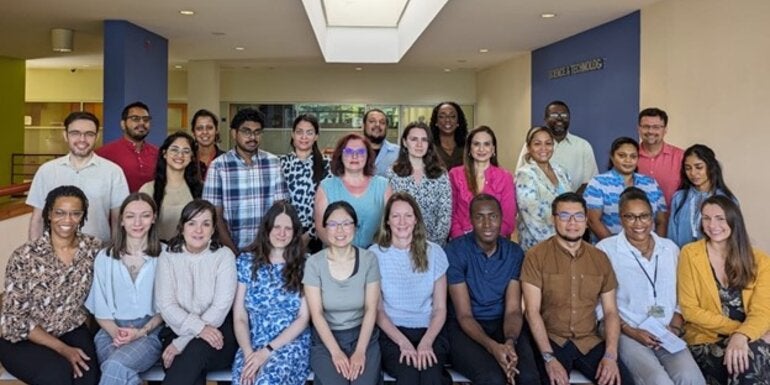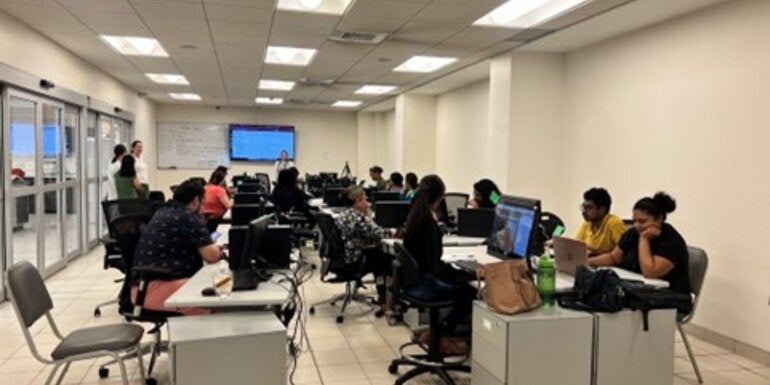
Trinidad and Tobago, March 4-8, 2024 – The Pan American Health Organization (PAHO) not only actively participated but also played a crucial supportive role in facilitating the involvement of PAHOGen Reference Sequencing Laboratories in a pioneering workshop from March 4th to March 8th in Trinidad and Tobago, focusing on the Bioinformatic Analysis of Metagenomic Sequencing Data. The goal of the workshop, which was organized by the University of West Indies (UWI) in association with the University of Cambridge Bioinformatics Training Facility and the UK Health Security Agency, was to strengthen genomic surveillance capabilities throughout the Americas.
Experts and participants from academic and public health institutions from six countries—Brazil, Chile, Colombia, North Macedonia, Panama, and Trinidad & Tobago—as well as representatives from public health laboratories attended the event. The Fundação Oswaldo Cruz (FIOCRUZ), in Brazil; Instituto de Salud Pública de Chile (ISPCH); Instituto Nacional de Salud (INS); Instituto Conmemorativo Gorgas de Estudios de la Salud (ICGES); University of West Indies (UWI); and Trinidad and Tobago were the five PAHOGen Reference Sequencing Laboratories that received training. This event facilitated collaboration, a vital component for mitigating emerging health hazards, by connecting expertise and resources.
PAHO's Laboratory Specialist for Viral Diseases, Dr. Juliana Leite, emphasized the workshop's importance in enhancing the PAHOGen Reference Sequencing Laboratories' capabilities. In line with the PAHO Regional Genomic Surveillance Strategy for Epidemic and Pandemic Preparedness and Response, she pointed up its critical role in increasing genomic surveillance capability for readiness and response to emerging pathogens.
Prof. Christine Carrington, Head of the Department of Preclinical Sciences at UWI, Augustine, and Coordinator of the PAHOGen Reference Sequencing Laboratory at UWI, highlighted the importance of bioinformatics skills in the early detection and monitoring of infectious diseases. She expressed gratitude for the support from PAHO/WHO, which facilitated broader regional participation, thereby enhancing accessibility to essential training resources.
The workshop on metagenomics provided participants with an extensive exploration of a wide range of methodologies, from conventional amplicon-based approaches to state-of-the-art Hi-C metagenomics. Attendees received vital knowledge about how to use several bioinformatic software programs for tasks including data processing, quality control, and downstream interpretation through informative talks and hands-on training. Most importantly, the workshop additionally emphasized the important implications of these approaches for public health, highlighting the critical role that they play in disease surveillance and response plans. Through the provision of a thorough understanding of the approaches and their practical applications, the workshop has unquestionably equipped attendees with the required information and abilities to effectively navigate the complexity of microbial community analysis.
Significantly, the workshop enabled cooperation between five PAHOGen Reference sequencing laboratories: Instituto Nacional de Salud (INS) - Colombia; Fundação Oswaldo Cruz (FIOCRUZ) - Brazil; Instituto de Salud Pública de Chile (ISPCH) - Chile; Instituto Conmemorativo Gorgas de Estudios de la Salud (ICGES) - Panama; and UWI - Trinidad and Tobago. This collaborative effort represents a united front in strengthening regional genomic surveillance capabilities.





